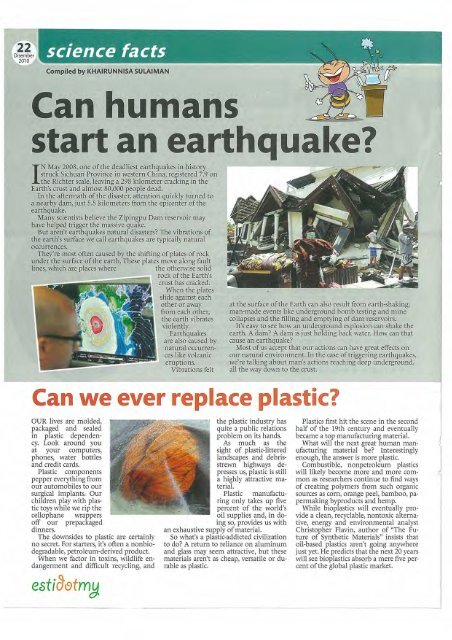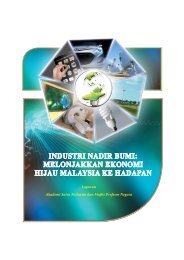1 - Akademi Sains Malaysia
1 - Akademi Sains Malaysia
1 - Akademi Sains Malaysia
Create successful ePaper yourself
Turn your PDF publications into a flip-book with our unique Google optimized e-Paper software.
22<br />
Disember<br />
2010<br />
Compiled by KHAIRUNNISA SULAIMAN<br />
Can humans<br />
start an earthquake<br />
I N May 2008, one of the deadliest earthquakes in history<br />
struck Sichuan Province in western China, registered 7.9 on<br />
the Richter scale, leaving a 298 kilometer cracking in the<br />
Earth's crust and almost 80,000 people dead.<br />
In the aftermath of the disaster, attention quickly turned to<br />
a nearby dam, just 5.5 kilometers from the epicenter of the<br />
earthquake.<br />
Many scientists believe the Zipingpu Dam reservoir may<br />
have helped trigger the massive quake.<br />
But aren't earthquakes natural disasters The vibrations of<br />
the earth's surface we call earthquakes are typically natural<br />
occurrences.<br />
They're most often caused by the shifting of plates of rock<br />
under the surface of the earth. These plates move along fault<br />
lines, which are places where<br />
the otherwise solid<br />
rock of the Earth's<br />
crust has cracked.<br />
When the plates<br />
slide against each<br />
other or away<br />
from each other,<br />
the earth vibrates<br />
violently.<br />
Earthquakes<br />
are also caused by<br />
natural occurrences<br />
like volcanic<br />
eruptions.<br />
Vibrations felt<br />
at the surface of the Earth can also result from earth-shaking,<br />
man-made events like underground bomb testing and mine<br />
collapses and the filling and emptying of dam reservoirs.<br />
It's easy to see how an underground explosion can shake the<br />
earth. A dam A dam is just holding back water. How can that<br />
cause an earthquake<br />
Most of us accept that our actions can have great effects on<br />
our natural environment. In the case of triggering earthquakes,<br />
we're talking about man's actions reaching deep underground,<br />
all the way down to the crust.<br />
Can we ever replace plastic<br />
OUR lives are molded,<br />
packaged and sealed<br />
in plastic dependency.<br />
Look around you<br />
at your computers,<br />
phones, water bottles<br />
and credit cards.<br />
Plastic components<br />
pepper everything from<br />
our automobiles to our<br />
surgical implants. Our<br />
children play with plastic<br />
toys while we rip the<br />
cellophane wrappers<br />
off our prepackaged<br />
dinners.<br />
The downsides to plastic are certainly<br />
no secret. For starters, it's often a nonbiodegradable,<br />
petroleum-derived product.<br />
When we factor in toxins, wildlife endangerment<br />
and difficult recycling, and<br />
esfiaofmg<br />
the plastic industry has<br />
quite a public relations<br />
problem on its hands.<br />
As much as the<br />
sight of plastic-littered<br />
landscapes and debrisstrewn<br />
highways depresses<br />
us, plastic is still<br />
a highly attractive material.<br />
Plastic manufacturing<br />
only takes up five<br />
percent of the world's<br />
oil supplies and, in doing<br />
so, provides us with<br />
an exhaustive supply of material.<br />
So what's a plastic-addicted civilization<br />
to do A return to reliance on aluminum<br />
and glass may seem attractive, but these<br />
materials aren't as cheap, versatile or durable<br />
as plastic.<br />
Plastics first hit the scene in the second<br />
half of the 19th century and eventually<br />
became a top manufacturing material.<br />
What will the next great human manufacturing<br />
material be Interestingly<br />
enough, the answer is more plastic.<br />
Combustible, nonpetroleum plastics<br />
will likely become more and more common<br />
as researchers continue to find ways<br />
of creating polymers from such organic<br />
sources as corn, orange peel, bamboo, papermaking<br />
byproducts and hemp.<br />
While bioplastics will eventually provide<br />
a clean, recyclable, nontoxic alternative,<br />
energy and environmental analyst<br />
Christopher Flavin, author of "The Future<br />
of Synthetic Materials" insists that<br />
oil-based plastics aren't going anywhere<br />
just yet. He predicts that the next 20 years<br />
will see bioplastics absorb a mere five percent<br />
of the global plastic market.

















